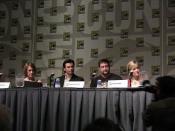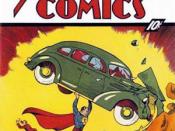Starting back in the earliest of human civilizations, mankind has looked for and created figures to look up to as heroes, as ideals to strive for and admire. Greek and Norse mythology are excellent examples of these creations, where a wide variety of heroes and gods are the players in the drama of the supernatural universe, and the explanation for the natural universe. In modern culture too, we have our own modern mythology. Our heroes and gods are not religious figures, however, and they are not venerated as gods. They are the characters we have grown to know and love that fill the pages of one of the most powerful genres in contemporary writing: the comic book.
Few genres in modern literature have created more controversy or generated a larger sub-culture than the powerful medium of the comic book. Although some might not consider this a literary genre, comic books have done a great deal to prove themselves over the past 70 years.
They have evolved far beyond their meager beginnings as the single strip "funnies"� printed in newspapers (hence the name, comics) early in this century into a genre in their own right, where entire universes exist. These universes embody both the realistic and the fantastical, both the idyllic and the loathsome. Striking and sometimes exaggerated illustrations, complex weekly story lines and superhuman subjects characterize this literary and artistic genre. Characterization is by far the most important element of this genre, though. It is in this element that one of the most significant changes has occurred since the comic book's inception nearly 70 years ago.
Early on in the history of comic books, characters were often nothing more than their special ability, or gimmick. For example, the Flash, who was the fastest man on earth, and the Green Lantern,


